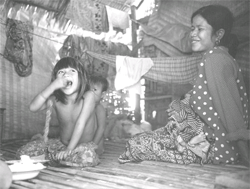CAMBODIA
 A cholera outbreak in northeastern Cambodia has killed54 villagers and left another 827 infected with the deadly bacteria, health officials said. Cholera cases were first reported in northern Ratanakiri province in mid-April, Gerry Pais of Health Unlimited said. "Unless we can bring it under control soon, we could have many more casualties,'' he said. Poor road conditions and distances between villages have frustrated efforts to wipe out the epidemic.
A cholera outbreak in northeastern Cambodia has killed54 villagers and left another 827 infected with the deadly bacteria, health officials said. Cholera cases were first reported in northern Ratanakiri province in mid-April, Gerry Pais of Health Unlimited said. "Unless we can bring it under control soon, we could have many more casualties,'' he said. Poor road conditions and distances between villages have frustrated efforts to wipe out the epidemic.
Cholera is caused by a deadly bacteria that flourishes in human waste and spreads quickly in crowded areas with poor sanitation. Symptoms include severe vomiting and diarrhoea. Pais said despite Ratanakiri's low population density, a combination of poor hygiene and a tendency for villagers to eat together allowed the bacteria to spread. Rehydration treatments and antibiotics are being used to treat the sick, and villages are being taught preventive measures, Pais said. One of Cambodia's least populated provinces, Ratanakiri is known for its dense and mountainous jungles.
Related Content
- 2024 Disasters in Numbers
- Learning Interrupted: Global Snapshot of Climate-Related School Disruptions in 2024
- Untapped potential: the role of local governments in locally led adaptation
- Advancing sustainable cooling in Cambodia to reduce energy consumption and greenhouse gas emissions
- Enhancing food security and nutrition and managing risks and shocks in Asia and the Pacific through support to social protection systems: regional synthesis
- Gendered impacts of climate change: evidence from Asia
